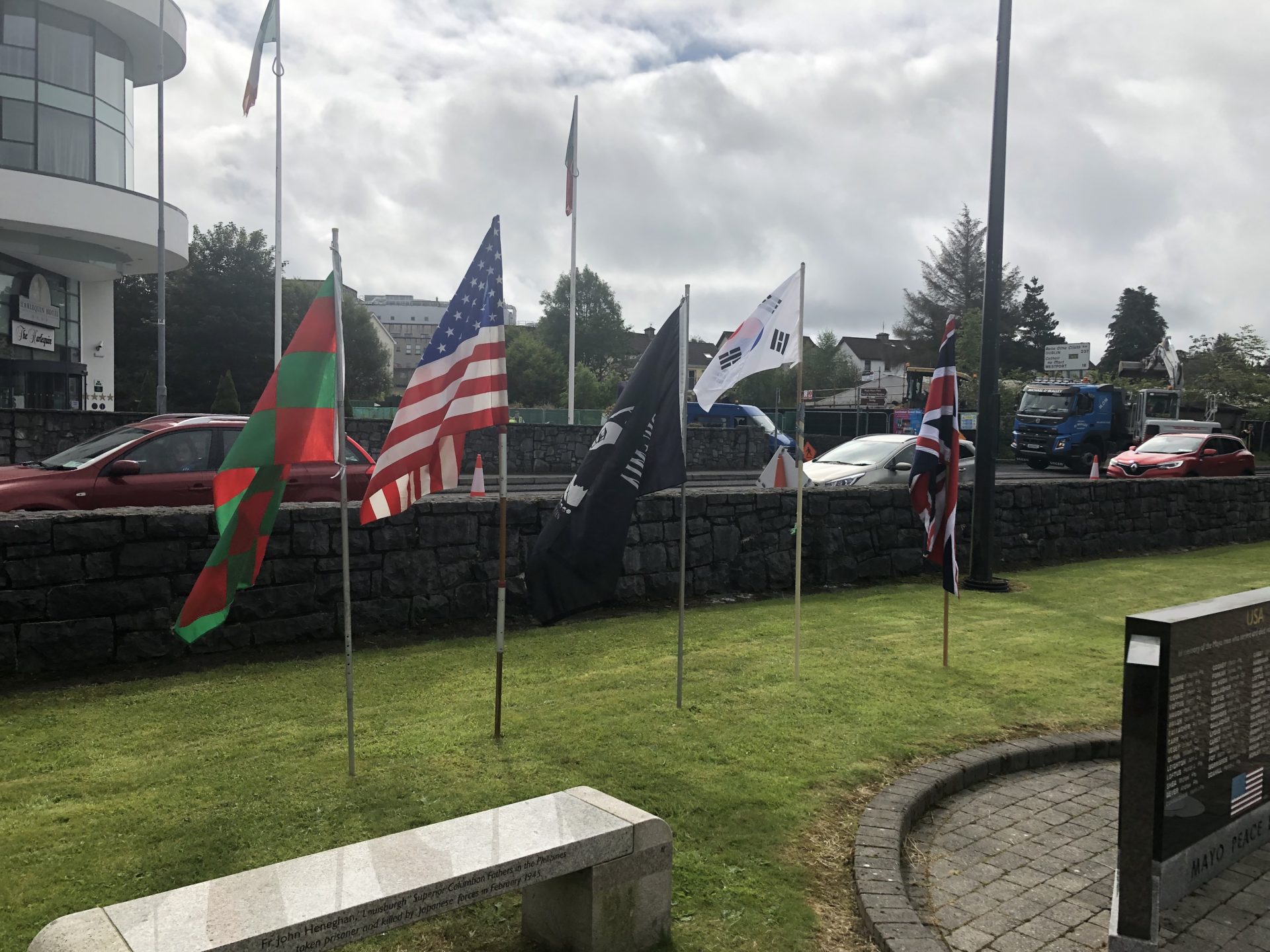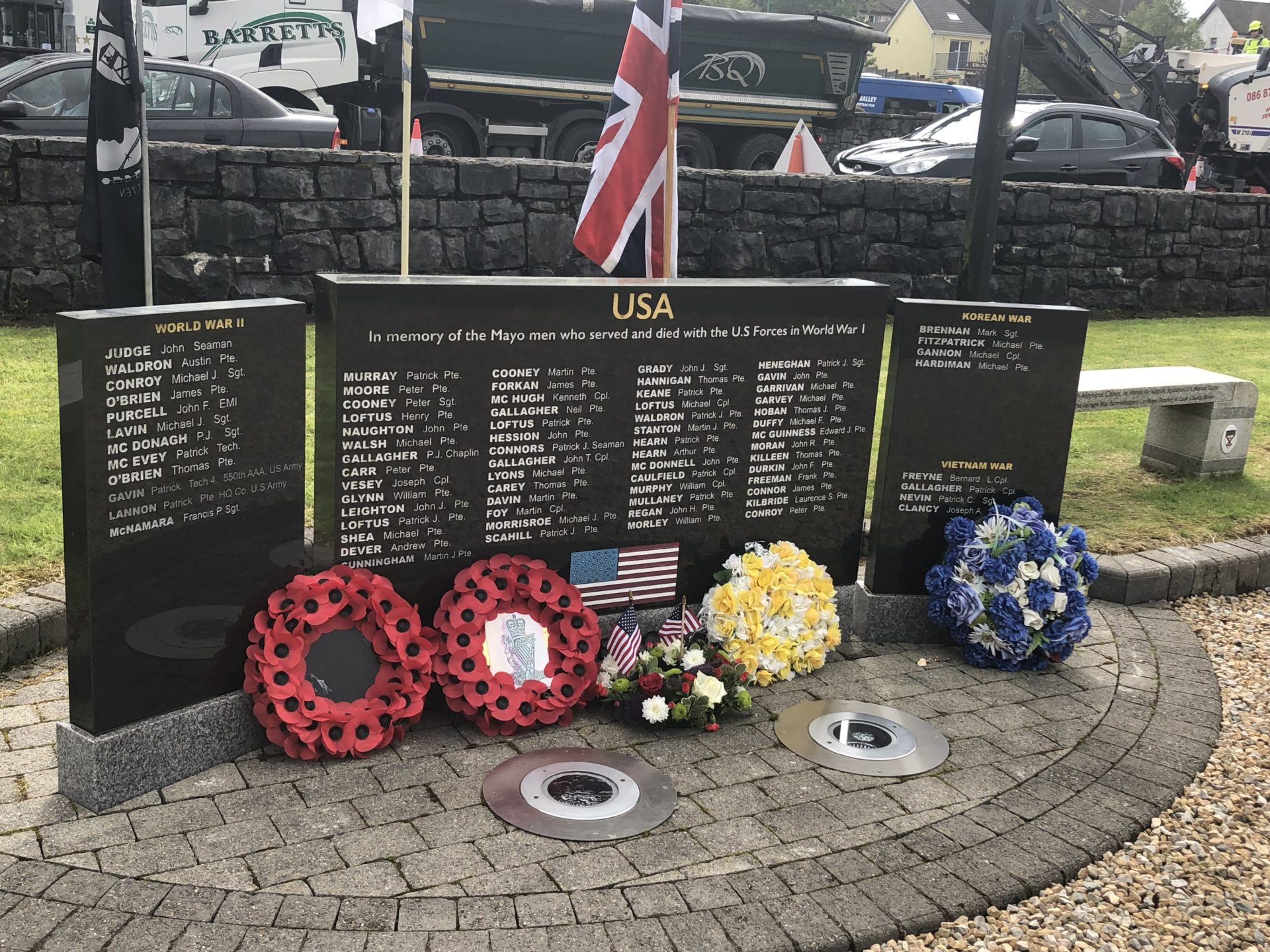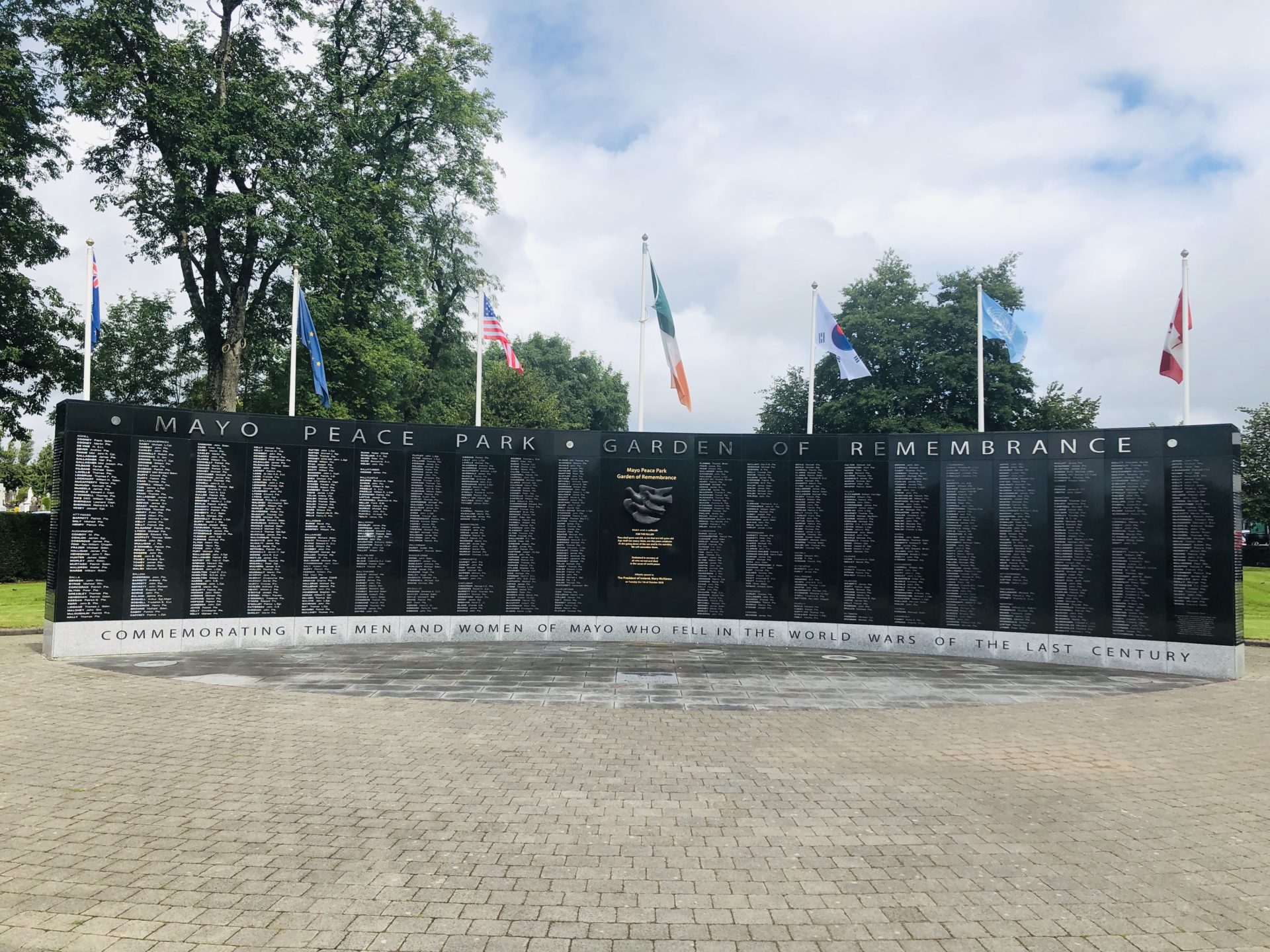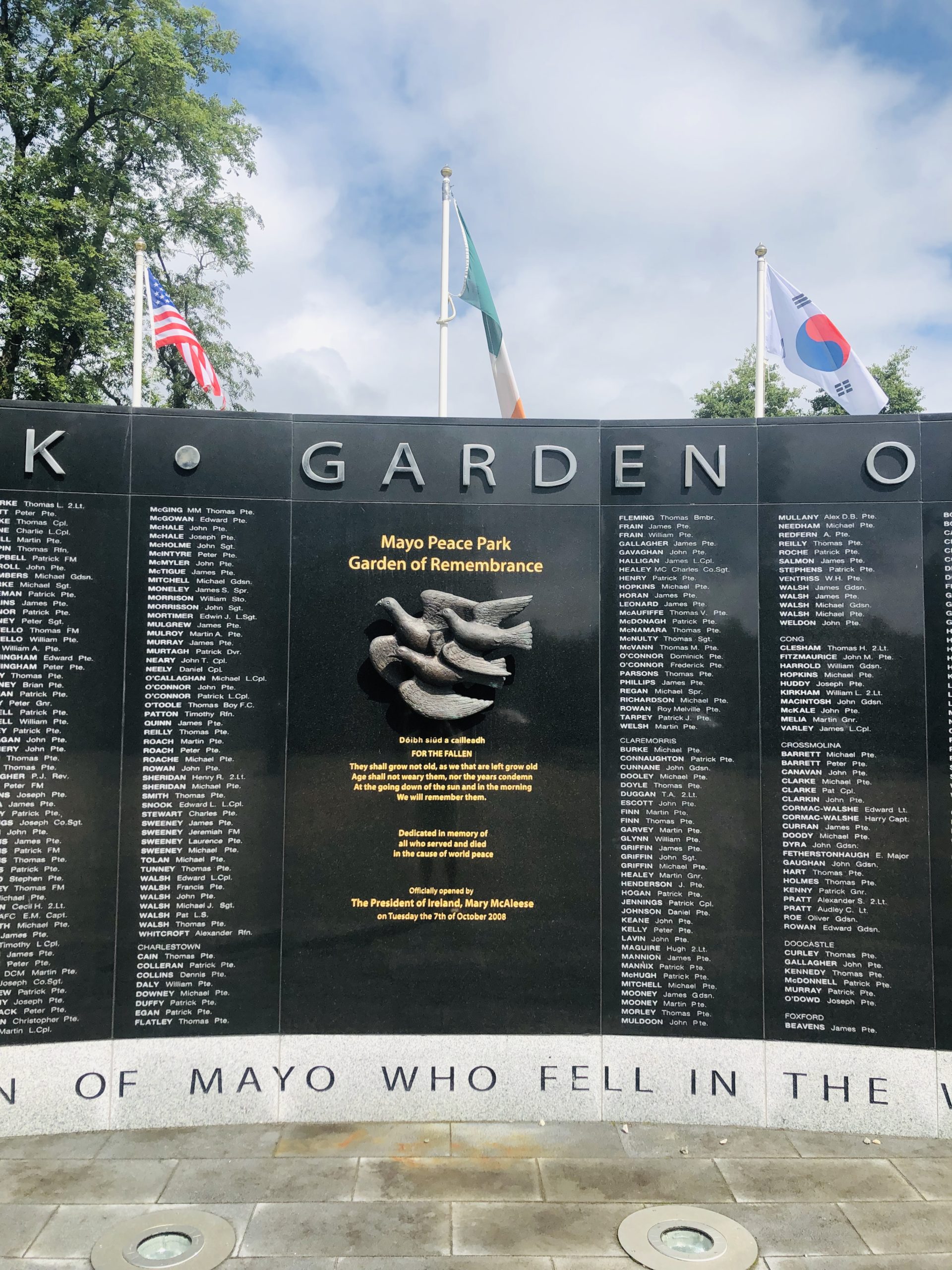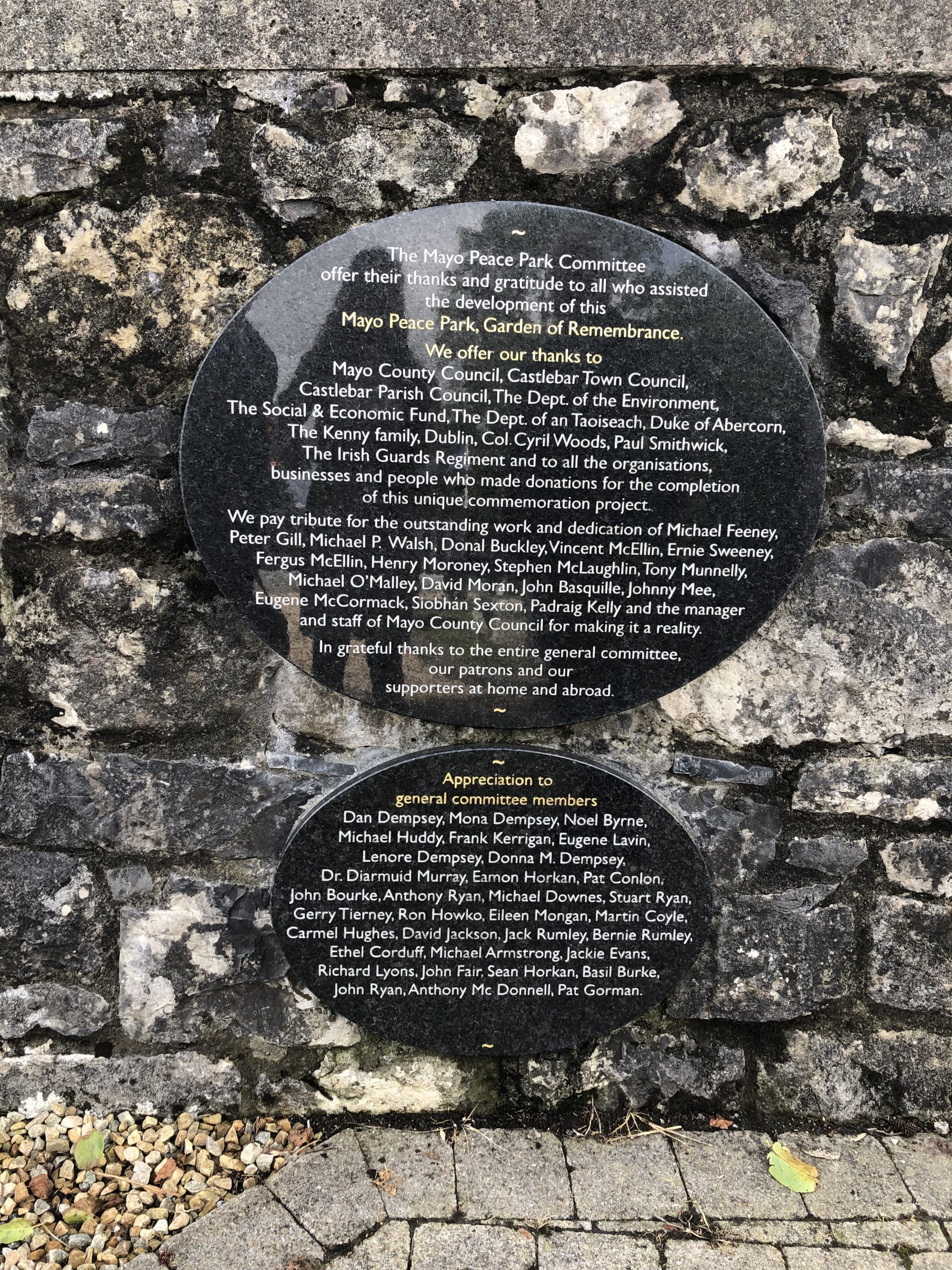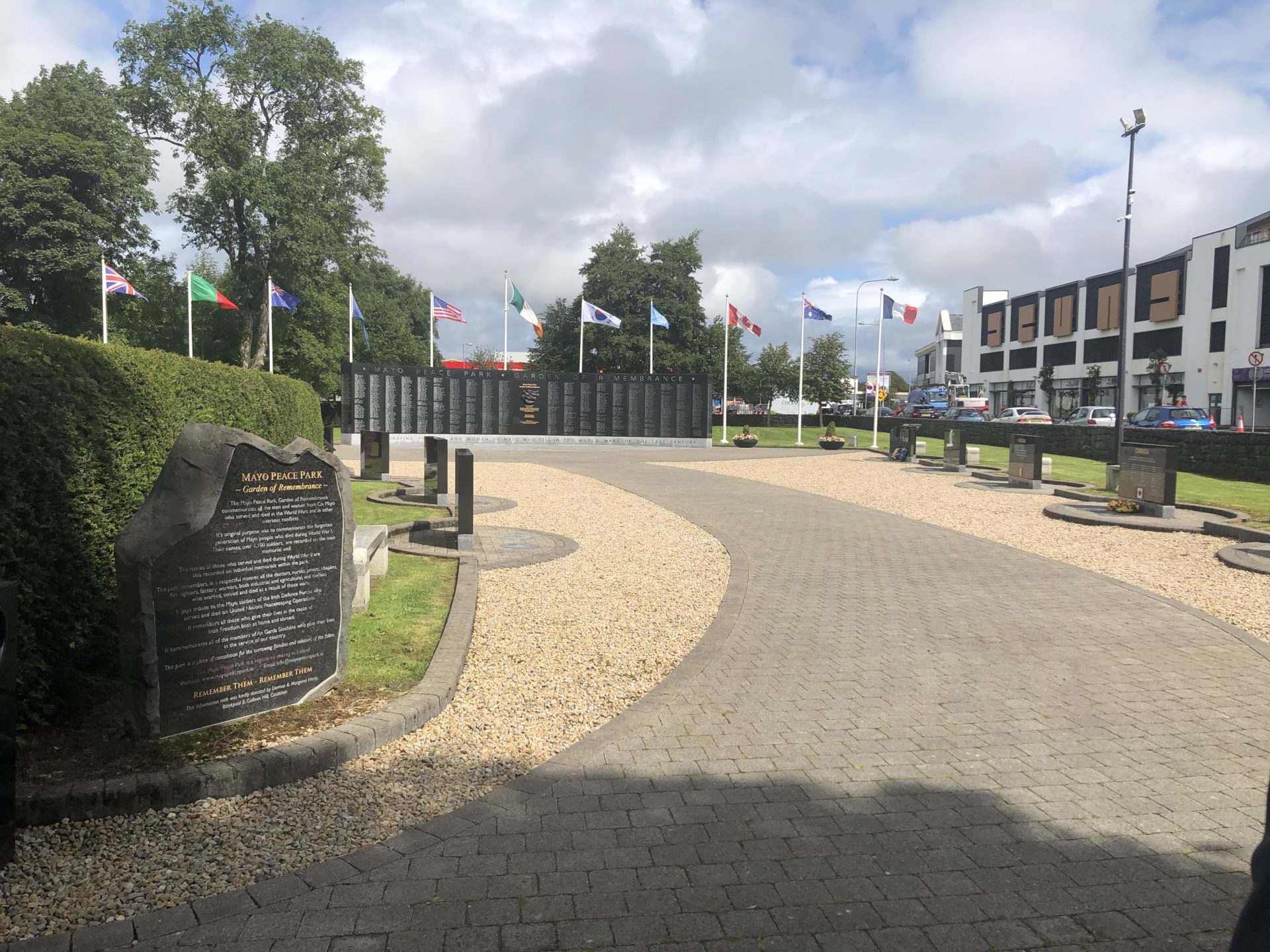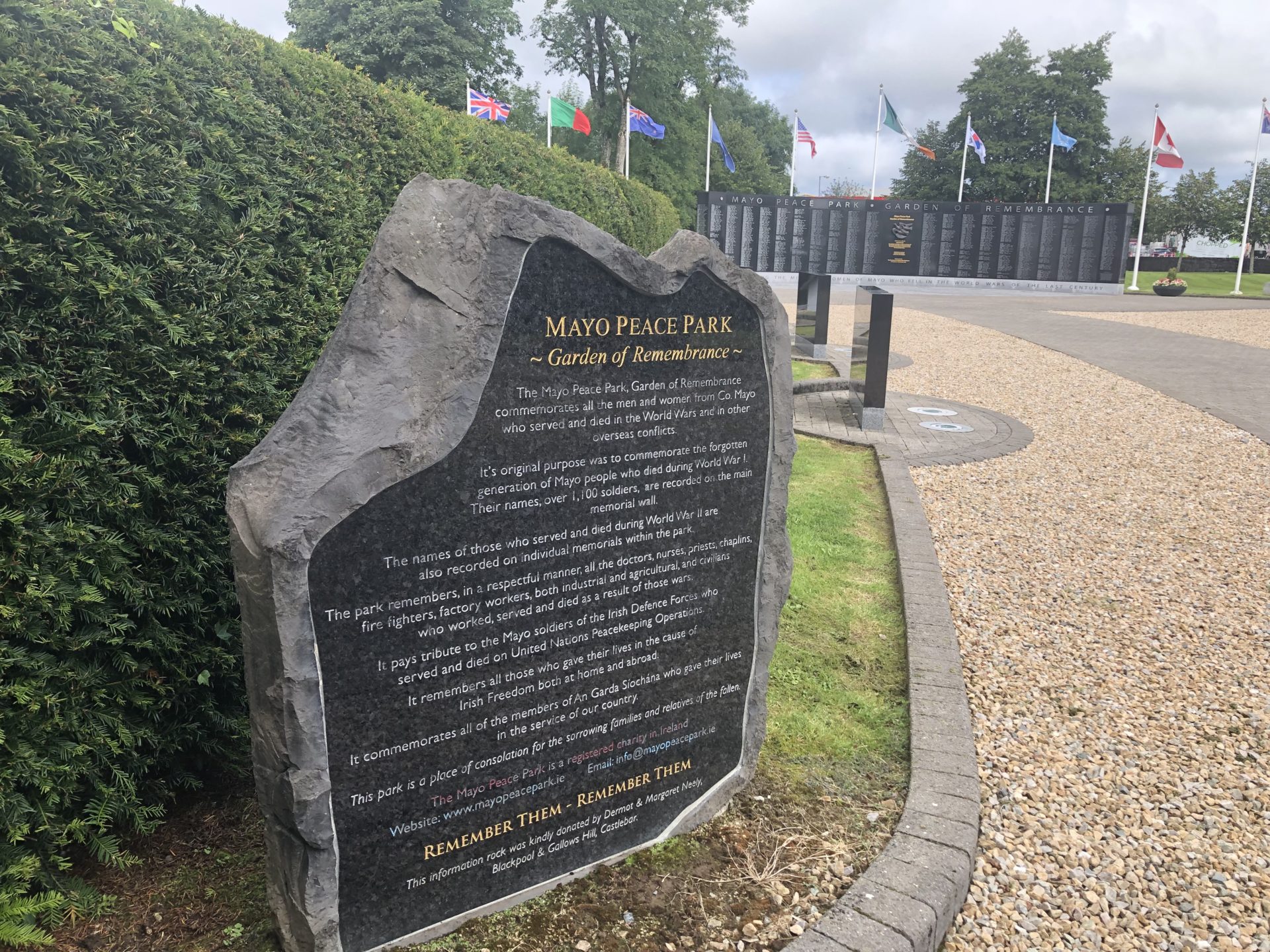>> [INAUDIBLE].
>> Okay. Well, you can go. Okay. Ready? Go.
>> [INAUDIBLE].
>> Hello, everybody, from Mayo County in Ireland. I am here at the Mayo Park Garden of Remembrance with many people, but particularly I'm here with the council members of the Mayo County, Mr. ...
>> Gavin.
>> ... Gavin and ...
>> Ger Deere.
>> ... Ger Deere. So thank you so much. Please say a few words about this beautiful town and the significance of having this Peace Park here right in the middle, the heart.
>> First of all [INAUDIBLE] deputy mayor [INAUDIBLE].
>> [INAUDIBLE]. We both do.
>> A thousand, 100,000 [INAUDIBLE]. Myself and councillor here were delighted to present you with [INAUDIBLE] very, very proud of this Peace Park here [INAUDIBLE] many, many years ago [INAUDIBLE]. We have people coming here from all over the world.
[ Chatter ]
So we're delighted to be involved. [INAUDIBLE] our municipal district are delighted to be involved, and we've been involved with this Peace Park right from the start. You can see all the names on the wall.
>> Yes, I love this inscription in particular, that, "Dedicated in memory of all who served and died in the cause of world peace," because everybody, at the end of the day, we remember the fallen to hope for peace and unity. So ...
>> [INAUDIBLE] by our president [INAUDIBLE].
>> By the president [INAUDIBLE]. I want to introduce Mr. Feeney, who is a chairman of the committee, right? So please come and ... So, Mr. Feeney, as you may have seen yesterday, he not only came to Dublin, took me everywhere yesterday, to all the visits, but he also escorted me to Mayo, which is almost 4 hours away from Dublin. But he is the one who thought of building this memorial, and this entire town supported it, got behind and actually made it into a reality. So please, what inspired you??
>> What inspired me was forgotten generation [INAUDIBLE] Korean War [INAUDIBLE] so many other wars. It was something that needed to be done at that time, and with the support of [INAUDIBLE] Council, our own committee, there was a lot of people involved [INAUDIBLE]. And we are proud [INAUDIBLE]. And so many people, such as yourself, come here who are proud of it, too. It's a tourist attraction. It's a memorial, heritage site, but it remembers the fallen and gives respect to all who served and died and gives respect most of all to the families who were left behind.
>> Yes.
>> [INAUDIBLE] ...
>> That is ...
>> ... people here had to go to Belgium and France [INAUDIBLE], but the graves are still out there.
>> Yes.
>> But at least we can remember them here [INAUDIBLE].
>> That is ... Thank you for pointing that out. This is not only to honor the fallen, but it's also for those left behind, right? The families and the town, the friends to come and remember. Of course, you don't need a wall or a memorial to remember them, but it is something where the community can come together and ...
>> Ma'am?
>> Yes?
>> I would like to add Mr. Jim Casey, the National Executive Chairman of the Irish United Nations Veterans to give a small presentation to you.
>> Oh, presentation.
[ Chatter ]
Oh, wow! So thank you. Wow! Thank you. What an honor, the Irish United Veterans Association, United Nation ... So as you know, the Korean War was a United Nations effort, and so Mr. Casey has come on behalf of the United Nations Irish Veterans Association. Thank you so much. If I'm correct, I'm going to ...
[ Chatter ]
Yes.
Oh.
>> On behalf of [Indistinct], another badge.
>> Wow!
[ Chatter ]
I'm having a lot of badges, everybody! This is a Mayo Peace Park Garden of Remembrance badge.
>> Yeah.
>> The doves.
>> Aw.
>> The doves were made in Germany.
>> Oh, wow, the doves were made in Germany. How symbolic is that?
>> [INAUDIBLE].
>> Yes, yes, thank you.
>> [INAUDIBLE].
>> Yes. So I just wanted to point out, remember the hearts that I've been pinning to all the grandpas? Well, I laid them at the marker where it actually lists from this town alone four who died, so I'm going to just take you over there. In fact, I'm going to bring the Columban Fathers, so remember yesterday I visited the Columban Fathers in [INAUDIBLE] Park? It's a little loud there. They're having construction, but, the fathers, would you like to join me when [INAUDIBLE] Korean War [INAUDIBLE]?
[ Chatter ]
>> So ...
[ Chatter ]
... they lived in Korea for 40 ...
>> [INAUDIBLE].
>> ... years. Can you believe that? And they speak Korean fluent, and they came today, and I want to point this out, so these are Irish who fought with the Americans and died, so in the Korean War, Sergeant Mark Brennan ..
>> Fitzpatrick.
>> ... Mr. Michael Fitzpatrick, Michael ...
>> Gannon.
>> ... Gannon and Michael ...
>> Hardiman.
>> ... Hardiman, so I laid these four in their honor, and we laid these wreaths, so, everybody, I just want to show ... Oh, you said you wanted to present something.
>> [INAUDIBLE] yes.
>> Yes.
>> We'll go over there because it's so loud here but ...
>> [INAUDIBLE].
>> [INAUDIBLE] seven Columbans that died in the Korean War.
>> Oh.
>> And I produced this. [INAUDIBLE] Smith is my name.
>> Wow.
>> We have a little piece of poetry here in English and in Korean remembering the seven Columbans that died.
>> Wow!
>> Seven who died and left the life [INAUDIBLE] with no word of farewell, seven great [INAUDIBLE] busy green truly fell [INAUDIBLE] to the green return, and when it came, have already [INAUDIBLE] rigid in the ground.
>> Wow, and you can read it in Korean, too?
>> Yes. Yeah.
>> Let's go over there. It is raining, so we're going to go inside, but ...
>> But anyway ...
>> ... these are the seven Columban Fathers who died in Korea during the Korean War.
They could've fled, but they chose to stay, so I'm going to just show you guys quickly this place, and then we're going to go in, so it's okay. [INAUDIBLE]. So look at this. It's of course a cemetery in the back, and this is the garden with all the different conflicts that ... and alliances, right?
>> Yeah.
>> The Irish alliances. I'm okay. And I'm okay. I'm okay.
>> [INAUDIBLE].
>> Yes, I'm okay. And this is where it lists more than 1,000 Irishmen who died in World War I, but of course over there that includes the Korean War and Vietnam War. Everybody, I cannot thank God enough for ... Just continue to bless me, bless everybody that joined me on this journey, so thank you very much, and I am going to be making my way back to Dublin later today and will soon be in Belfast where ... in Northern Ireland where I'll also be hoping for peace and unity there as well as meeting Korean War veterans, Irish who fought in the Korean War, so thank you, everybody. Bye.
